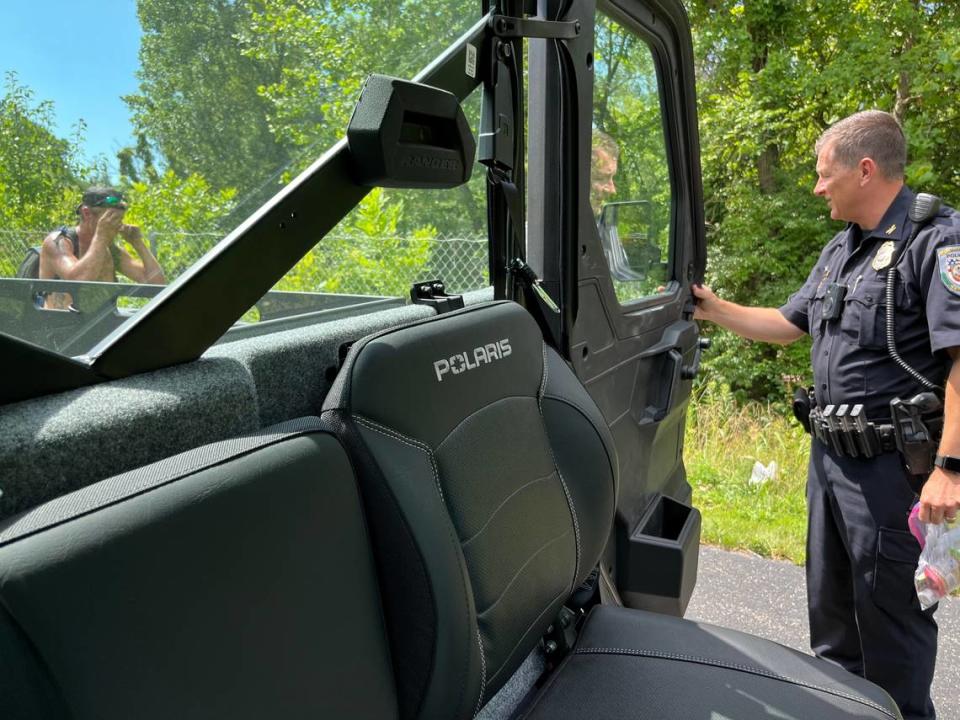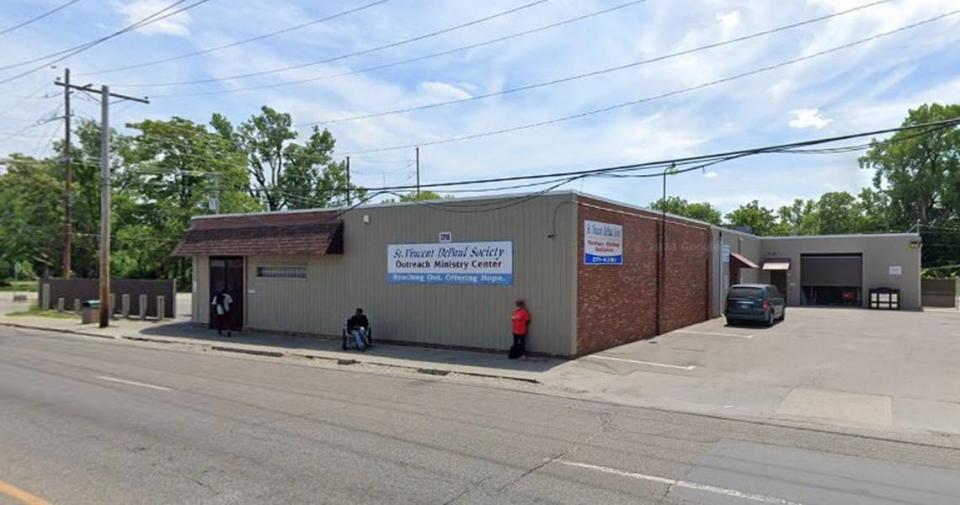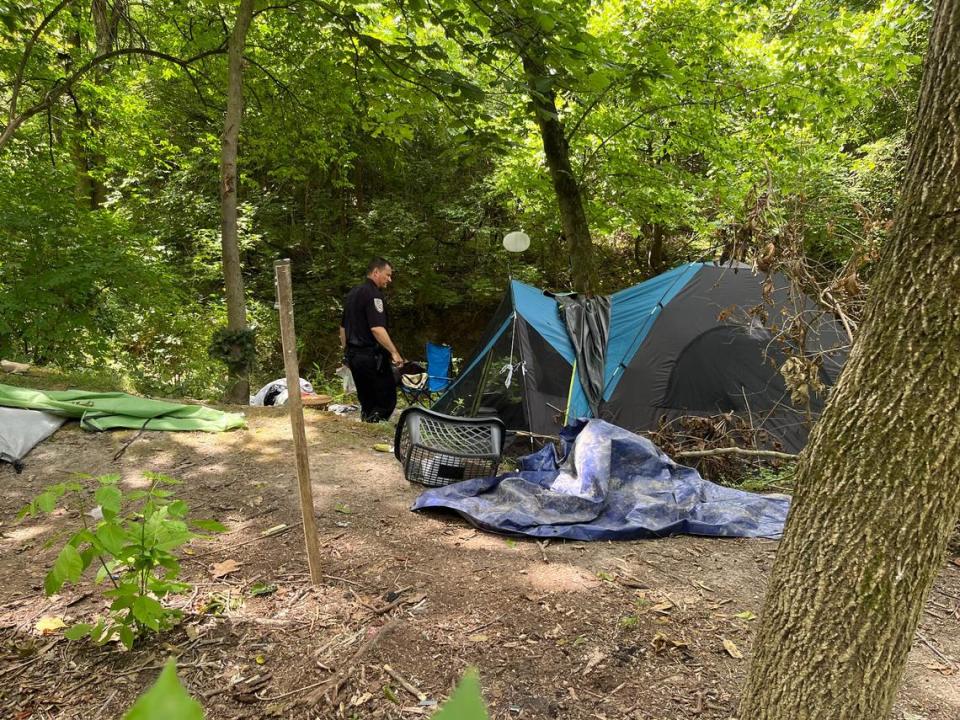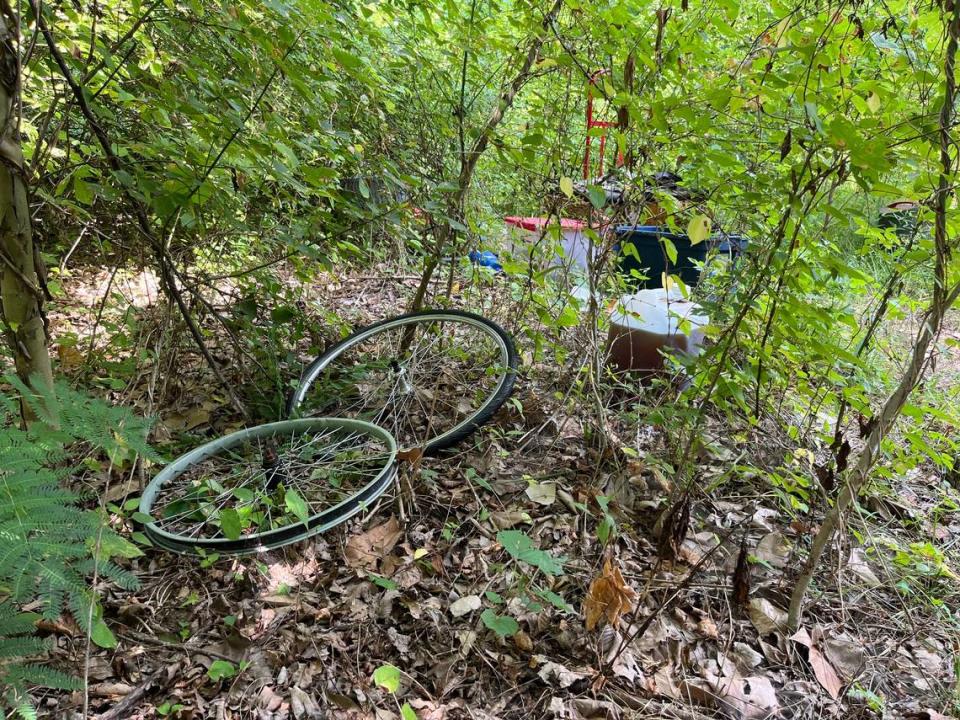Belleville, Swansea police respond to complaints about squatters camps along bike trails
The city of Belleville and village of Swansea are working to clear squatters camps from wooded areas along bike trails and in adjoining parks that have caused residents to complain this summer.
Belleville Police Chief Matt Eiskant and Swansea Police Chief Matt Blomberg said most people living in the camps are homeless, addicted to drugs or suffering from mental illness, and some are coming from former encampments along the St. Louis riverfront.
Local residents have reported seeing people sleeping in tents, building fires, strewing trash, using illegal drugs, yelling and cursing at passersby and crossing through private yards.
“People don’t feel safe when they’re riding or walking on bike trails and they see a camp set up and they’re getting yelled at or they see drug activity,” Eiskant said. “We’re dedicated to cleaning these areas up so our citizens feel safe.”
The term “squatting” refers to people occupying land or buildings that don’t belong to them without permission.
Some residents of the neighborhood around Cleveland Avenue and South Fifth Street in Belleville believe a “small uptick” in criminal activity, such as burglaries and vehicle and other thefts, is related to camps next to Southside Park, according to Eiskant.
Police have issued citations for curfew violations, illegal camping and narcotics possession in the park, which is bordered by Richland Creek Greenway Trail, a 2-mile biking and walking trail owned by the city of Belleville.
Similar complaints have involved North End Park, Eiskant said.
Ward 5 Alderwoman Shelly Schaefer, who represents the South Fifth Street Neighborhood, organized a meeting with the police chief at City Hall last month that was attended by about 50 residents. She also teaches third grade at Roosevelt School.
“It’s not that people are trying to pick on (homeless people),” Schaefer said this week. “That’s not it at all. I think people just want to feel safe.”
Schaefer said residents have told her about camps encroaching on their private property and strangers knocking on their doors and rummaging through their garages.
Schaefer said she has compassion for people struggling with mental illness and other problems, but she also wants to protect families, particularly those with children, in the neighborhood.
Ed Dintelman, the other Ward 5 council member, attended the meeting. He welcomed police involvement.
“It might take them a month or two, but they’ll get it fixed,” he said.
Officials have received some social-media pushback from commenters who argue that homeless people are often victims of circumstances beyond their control, including a shortage of affordable housing, and eviction isn’t going to solve the problem.
One advocate is Dawn Putnam, Dupo-based founding president of a charitable organization called Moms on a Mission.
“We serve the unhoused community in this area,” she wrote in a private Facebook message to the BND this week. “We NEED a walk in shelter with rehabilitation services.”

‘Recent phenomenon’
As of early July, police were aware of about a half-dozen camps in wooded areas along Richland Creek Greenway Trail and MetroBikeLink Trail, but those who live in them move around, making it difficult to get a solid count.
The MetroBikeLink Trail largely follows the MetroLink train route through Shiloh, Belleville, Swansea and Fairview Heights for 14 miles. It’s operated by St. Clair County Transit District and bordered by Bi-State Development land. A 5-mile extension is being planned.
SCCTD Managing Director Ken Sharkey called the camps a “recent phenomenon.”
“I wouldn’t say it’s blown up,” he said this week. “But if it doesn’t get resolved in a reasonable manner, it might have a tendency to become a little bit more uncontrollable.”
Sharkey noted that Richland Creek, which is home to fish, ducks, turtles and other wildlife, could be negatively affected by camping if used by humans for sewage disposal.
Sharkey supports police efforts, but he also would like to see the homeless people get help. He noted that the transit district partners with Chestnut Health Systems, a nonprofit agency that provides behavioral-health services. Some staff are stationed on MetroLink trains.
“We don’t want to be inhumane about it at all,” Sharkey said. “People struggle with life issues.”
Officials in metro-east municipalities have dealt with an increasing number of problems related to homelessness in the past four or five years, according to Eiskant and Blomberg.
In March, Belleville City Council voted to turn Ever and Anon Park in downtown Belleville into a fenced-in dog park limited to dues-paying members as a result of people sleeping in the gazebo and leaving needles, trash and human feces on the ground.
Bike trails are vulnerable to similar issues, Blomberg said.
“Those bike trails are absolutely wonderful assets to our neighborhoods and communities,” he said. “But they also generate access (to wooded areas largely hidden from public view).”
Eiskant suspects some in the squatters camps have crossed the Mississippi River since March, when the city of St. Louis made the most recent of several attempts to clear out encampments at Laclede’s Landing and elsewhere along the riverfront, where dozens of homeless people were living.
Another factor in the metro-east is that its only homeless shelter, operated in East St. Louis by the Society of St. Vincent de Paul, has been temporarily closed since early June.
Shelter Director Pat Hoegrebe said the non-government-supported ministry has limited funds and summer breaks allow it to do repairs and give employees vacation time while encouraging residents who have gotten “a little too comfortable” to get out and find permanent housing.
“Our donations go down in the summer, so we try to take a big swallow and recover from that,” Hoegrebe said.

Complicated and divisive
Homelessness is a complicated and divisive issue all over the country. It often pits citizens who don’t want tents set up along city streets against those who argue that homeless people are victims of drug addiction, mental illness, housing shortages and other problems and may have nowhere else to go.
Blomberg posted a message on the Swansea Police Department’s Facebook page earlier this month, letting local residents know that officers were looking into complaints about camps along the MetroBikeLink Trail. The post resulted in 215 likes and 88 comments that presented a variety of viewpoints.
Some commenters thanked police for trying to keep the trail safe for bicyclists and pedestrians. Others were more critical.
“Everyone needs somewhere to live. Making it impossible to survive homeless is ridiculous,” one wrote. “I say leave them alone if they aren’t hurting anyone or anything. Where you expect them to go?” asked another.
One woman shared a personal experience: “Herein lies the problem. They have the potential to hurt someone. Have you ridden the trail and had one of them jump out at you? Chasing you and screaming to get off THEIR property? Because most of them have some sort of mental illness they are unpredictable.
“I have empathy for anyone who finds themself in this predicament. But I also have concerns for myself and my families safety while using the bike trail. Hopefully they can be relocated to a safe homeless shelter.”
Another man pointed out that property owners could be held liable for sanitation and other hazards created by squatters camps. Blomberg made a similar point in an interview last week.
“It’s not like we’re trying to criminalize this or arrest them, but they do need to go somewhere else,” he said. “We have a responsibility to property owners who don’t want these folks on their property.”
Property owners along the Richland Creek Greenway and MetroBikeLink trails range from individuals and businesses to municipalities and government agencies, including Bi-State.
It’s illegal to camp in public places in Belleville. The related ordinance requires officials to inform people who are squatting about a regional homeless shelter that’s available. The city offers to pay for bus transportation, but many turn it down, according to Eiskant.
“Years in the past, we had people setting up tents on sidewalks,” he said. “We can’t have that.”
Eiskant noted that some homeless people also are squatting in vacant homes in Belleville. This causes headaches for the health, housing and building department and contributes to crime in neighborhoods, although overall crime rates in Belleville have dropped, he said.
Swansea parks are closed at night and therefore don’t allow overnight stays.
Both municipalities deal with illegal camps in similar ways. Code-enforcement officials start by hand-delivering or posting notices, telling people who are squatting that they must vacate within a specified period of time (10 days in Belleville; five business days plus a weekend in Swansea).
If that doesn’t happen, tents and other items are collected and stored for 30 days. After that, they’re disposed of as unclaimed property.
“(Homeless people) have rights, too,” Blomberg said, referring to provisions of the Illinois Bill of Rights for the Homeless Act, enacted in 2013. “... So we have to follow certain rules, and that can create some frustration for complainants. We can’t just take away all their things.”

Patrolling the trails
Swansea Police Department recently received grant funding to buy a utility-task vehicle that can be used to respond to emergencies and better patrol the MetroBikeLink Trail.
On a recent weekday, Blomberg allowed a reporter to ride along and observe two of the squatters camps. Tents were nestled in woods and surrounded by folding chairs, tarps, tubs of clothing, bicycle wheels, fishing poles, a barbecue grill and other supplies, as well as trash.
At one point, a man rode up on a child’s bike, wearing a backpack and pulling a small trailer near one of the camps, where village officials already had posted a notice to vacate.
“Is that your stuff back there?” Blomberg asked. “I’m getting it out,” the man responded. Blomberg offered him a plastic bag of toiletries, snacks and first-aid items and asked if he needed any other help. The man declined.
Eiskant refers to most people living on Belleville streets as “voluntarily homeless” because, he said, many have told him that they have places to stay but don’t want to live with family or go to shelters because of rules against drug use.
Hoegrebe, a longtime advocate for the poor, agrees that some homeless people choose that lifestyle, and the Society of St. Vincent de Paul shelter in East St. Louis has a “no tolerance” policy on drugs.
But many want to overcome addictions or mental illness and get back on their feet, she said. Shelter staff work to connect them with community resources, help them sign up for Social Security or find treatment, housing, jobs or transportation to doctor’s appointments.
The shelter is part of an Outreach Ministry Center with a soup kitchen and thrift store at 3718 State St. in East St. Louis. When open, it averages 75 people a night but has held 100, according to Hogrebe.
“We rarely have to turn people away,” she said. “But we stay at capacity, especially in cold weather.”
Hoegrebe has mixed feelings about people camping along metro-east bike trails. On one hand, she supports the police and the rights of property owners, bicyclists and pedestrians.
“You can’t have a bunch of (homeless people) trashing the bike trail and terrorizing homeowners,” she said. “You’ve got to have law and order. But I think we need to offer them other alternatives.”
That means affordable housing and treatment for drug addiction and mental illness, including medication, Hoegrebe said. She also suggested that local residents who are concerned about homelessness support shelters and organizations that provide services.
People can reach the Society of St. Vincent de Paul Belleville Council by calling 618-394-0126 or visiting the website at www.svdpsouthil.org.
The job of police officers is to enforce laws, according to Eiskant and Blomberg, but they’re trying to work with other government agencies and private organizations to help with the homeless problem.
“It’s not just Belleville issue,” Eiskant said. “It’s a whole metro St. Louis issue.”




